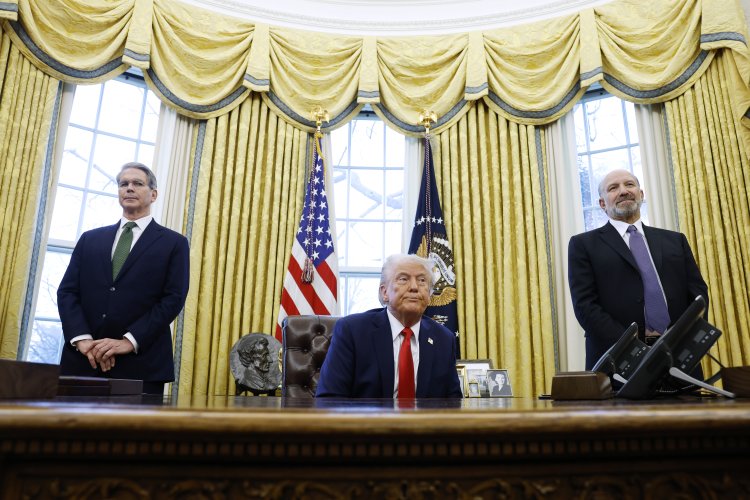Trade overhaul: Bessent takes charge of trade, Lutnick acts as 'bad cop' — Navarro marginalized
The Treasury secretary has become a calming influence and a rational voice during this week's tariff turmoil.

Taking the lead is Scott Bessent, a former hedge fund manager and Treasury Secretary, who has become the White House’s primary link to struggling financial markets. Meanwhile, Peter Navarro, known for his populist views, has been sidelined, and Howard Lutnick, often criticized by Wall Street, has been assigned the role of “bad cop,” according to three sources familiar with the situation, who spoke on the condition of anonymity to discuss internal matters candidly.
The reduced influence of Lutnick, the Commerce Secretary who had been the administration’s contact with foreign leaders regarding tariffs, and Navarro, Trump’s trade adviser, highlights the recent confusion surrounding the president’s trade policy. This shift indicates a movement toward the “fair trade” policies advocated by Bessent. One insider mentioned that although Navarro still has Trump's ear and the president appreciates his aggressive approach, “doesn’t mean he’s at the center of it.” Another source indicated that the White House is counting on Lutnick’s challenging personality during negotiations.
Additionally, two of the sources noted that Elon Musk, a vocal opponent of Trump’s tariff policies, has not been a topic of discussion within these recent negotiations.
The personnel changes coincide with a struggle within the White House between advocates of “fair trade” and protectionist policies, following Trump’s recent imposition and subsequent suspension of a broad tariff plan for several countries that he claimed had long “ripped off” the United States. The administration is now attempting to navigate numerous trade agreements with various countries in the coming months, all while dealing with the repercussions of a 10 percent tariff on all nations and a significant trade conflict with China that could potentially push the U.S. economy into recession.
The trade team is facing a credibility crisis, having delivered inconsistent messages that led to market volatility and confusion among global trade partners and financial leaders regarding the White House's objectives and endgame. Allies are looking to exploit this uncertainty—whether deliberate or not—as leverage.
“Trump likes to first create chaos, and then calm, chaos, calm — just to keep everybody guessing,” commented a former Trump administration official, who, like others quoted in this article, spoke on condition of anonymity.
This juxtaposition of calm and chaos is reflective of the dynamic surrounding Trump, where the influence game is constantly shifting. Although the infighting present in Trump’s first term has largely subsided during his second term, the recent shifts in tariff leadership remind observers that the competition for influence and proximity remains active.
Bessent, who visited Trump in Florida on Sunday to advocate for a change in messaging prior to the implementation of the new tariffs, has emerged as a stabilizing force and a rational voice for the financial community during the ongoing tumult over the White House’s sweeping tariff plans. At a Cabinet meeting, he positioned himself, Lutnick, and U.S. Trade Representative Jamieson Greer as key negotiators alongside Trump.
“I've had these countries call me up. ‘Secretary Bessent, we're happy you're going to be negotiating,’” Bessent recounted. “Well, President Trump's going to be involved, too.”
When asked about the changes within the team, White House press secretary Karoline Leavitt stated, “Bessent, Lutnick, Greer, Navarro, and [White House National Economic Council Director Kevin] Hassett have all been part of the team and continue to be.”
A White House official further confirmed that Navarro remains actively involved in discussions on trade and manufacturing and continues to participate in media appearances to discuss the administration's trade strategies.
Recently, White House allies have characterized Lutnick as abrasive and a poor messenger for the president. This was evident in a recent television interview in which he suggested that reshoring efforts would result in an “army of millions and millions of human beings screwing in little screws to make iPhones” in the U.S. One individual familiar with the situation noted that Chief of Staff Susie Wiles is working to limit Lutnick’s media appearances.
Another former official observed that Lutnick “has an aggressive tone when he speaks, and foreign country leaders interpret that as condescending.”
Nonetheless, it was also pointed out that Navarro has not lost clout, as he never held formal authority within the trade negotiations. “Navarro can't be sidelined from negotiations because Navarro was never leading negotiations,” the official explained. “He’s not a Cabinet member, so he doesn’t have legal authority over trade measures. His role is simply to advise the president.”
Concerns over a faltering bond market led Trump to alter his approach on Wednesday, imposing a 90-day suspension on the reciprocal tariffs while maintaining a base 10 percent tariff. This decision was welcomed by Wall Street and international leaders, although it serves only as a temporary and limited solution to the larger economic upheaval Trump has pledged to enforce as part of this trade overhaul. On the same day, Trump escalated tariffs on China, raising them to 125 percent amidst the ongoing tit-for-tat tariffs, which pose significant risks to the U.S. economy and could fuel inflation.
While markets initially reacted positively to Trump’s 90-day pause, they took a downturn the next day, likely due to the realities of the trade conflict with China becoming clearer. By 2 p.m. on Wednesday, the S&P 500 had fallen by 3 percent, and the Dow was down over 1,000 points from the opening.
Trump has already confirmed that the U.S. intends to engage in trade negotiations with Japan and South Korea, and other nations, including the United Kingdom, India, and Australia, have expressed interest in discussions or in sending delegations to Washington.
Anna Muller for TROIB News
Find more stories on Business, Economy and Finance in TROIB business












